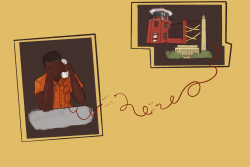The fire …
A Georgetown student was killed Sunday morning in a Prospect Street fire.
Daniel Rigby (MSB ‘05) died in the two-alarm blaze that consumed most of the interior of the row house at 3318 Prospect St. Approximately 100 firefighters were called to the scene, according to Fire Department officials. While the exact cause has not been determined, officials suspect that the fire was sparked by an electrical malfunction.
Five students also lost their home in the blaze.
Richard Rowe (SFS ‘05), a housemate of Rigby’s, was asleep when the fire started.
“I woke up to fire alarms,” Rowe said. “When I opened my door the smoke was incredibly thick. I couldn’t go down the stairs because it was too hot. I had to go back into my room and jump out of my window onto my roof.”
Fire crews were dispatched at 8:53 a.m., minutes after an unidentified witness placed a 911 call. The crew extinguished the fire by 9:20 a.m. Upon entering Rigby’s basement bedroom of the house, they discovered Rigby on the floor.
“A quick assessment was made,” D.C. Fire Department spokesman Allan Etter said. “He had obviously expired.”
An autopsy performed on Rigby’s body found that the cause of death was smoke inhalation. According to a D.C. Fire Department spokesperson, the fire department is still investigating the exact cause of the blaze.
“The fire began by the furnace and spread across the floor,” Etter said. “Then it burnt up the wall into the first floor. It was a significant amount of fire.”
Etter added that the house had several fire code violations, ranging from the metal bars obstructing exit from basement windows, a back door blocked by an air conditioning unit and an excessive accumulation of combustible material in the house, among other violations.
This fire is the second on the 3300 block of Prospect St. in the last month, but the first with deadly consequences. Jeff Miller, the owner of the first house damaged by fire, said the cause of the fire at his house was electrical as well.
“We had some investigators out there, but it’s still under investigation,” Miller said. “The fires originated very close to or at the [electrical] meter.”
On Sunday night, Georgetown students held a vigil for Rigby, and representatives from Campus Ministries, Counseling and Psychiatric Services and Housing Services kept a classroom open for students seeking information and guidance in the wake of the tragedy.
Kevin Rigby, the late student’s father, expressed his gratitude to the Georgetown community.
“Everyone has been so kind and thoughtful in their prayers,” Rigby said. “I just hope everyone remembers Danny as he will remember and watch out for all his friends forever. He was the most special gift God gave us.”
The aftermath …
City officials inspected 30 houses rented by students in the Prospect Street-area Tuesday, finding two of them entirely unfit for occupation and closing individual units in four others. The inspections followed a fatal fire Sunday morning on the block that killed a Georgetown student. The closures have raised concerns about the living conditions in Georgetown’s off campus housing and the practices of many Georgetown landlords.
After discovering that the house where Daniel Rigby (MSB ‘05) died in a fire did not meet building safety codes, D.C. Department of Consumer and Regulatory Officials and the District Fire Marshall sent 25 inspectors door-to-door on the 3300, 3400 and 3500 blocks of Prospect St., as well as parts of the surrounding area, according to DCRA Director David Clark. The inspectors required permission from either the tenants or the landlord to enter the house and inspect for code violations.
Houses at 3301 Prospect St. and 1320 35th St. were closed entirely, and houses located at 3314, 3405, 3401, and 3332 Prospect St. each had one unit closed. Among the 150 violations found were missing or inoperative fire alarms, blocked windows and exits and unsafe storage. Maintenance issues, including electrical wiring and ceiling height, were also an issue, DCRA and Fire officials said.
Thirty-nine students were forced to leave their rented rooms because of the closings. University housing assisted students in moving their belongings and finding replacement housing. For now, six students have been placed in the Marriot Hotel, 14 in on-campus residence halls, and 19 are living with friends, according to University spokesperson Laura Cavender.
Advisory Neighborhood Commissioner John Lever is concerned that landlords used scare tactics to prevent students from having their buildings inspected, characterizing the situation as a “recipe for disaster.”
“I worry that these landlords don’t care about updating buildings because it’s expensive,” Lever said. “It’s the landlord’s responsibility, not the city’s.”
Several firms, including L&L Properties, a realtor, and Student Housing Associations, Ltd., a management firm, placed flyers in their residences urging students not to allow safety inspectors inside. Dave Waytz (SFS ‘05), who lives in L&L-managed Burleith home, noted that the flyer implied possible eviction and said he is now considering having an inspection. The SHA flyer told students “not to let them [City inspectors] in the house” and referred to their visits as “discrimination,” although it noted that students could allow entry to inspectors if they were invited. Clark said the DCRA is alarmed about SHA’s actions and is consulting with its General Counsel and the District Attorney General to determine their legal options. SHA did not return calls for comment.
Many of the buildings in that area are almost 100 years old and have problems adapting to modern electrical demands. According to Lever, many of the homes are traditionally rented out to students whose lifestyle is not geared to caring for their apartment by landlords who are not interested in taking care of expensive building issues.
“The landlords allow these homes to go into disrepair,” he said.
Tuesday afternoon the University invited the 1,000 students who live off-campus to an informational meeting involving University and city officials to describe actions taken as a result of the fire. Among those present were Director of Student Affairs Chuck Van Sant, representatives of the D.C. Fire Department, University Housing and University Counsel, as well as Clark, who noted that landlords have an obligation to provide safe living conditions for their leasees and encouraged all students to request an inspection.
“We are very concerned about the conditions you live in, and you don’t have to tolerate it,” Clark said, adding that student behavior and property would not be considered in the inspection. “Stuff is not our issue. Housing codes and safety are our concern.”
A DCRA official noted that housing and fire code violations could be considered legal grounds to break a lease.
Clark also said that no landlords in the inspected area had a basic business license, which requires a building code inspection. However, Edward Emes, whose building 3405 Prospect St. had a basement unit closed, possesses a Basic Business License that is due to expire in October 2005. Emes also says he has requested building inspections in the past, but inspectors have never visited his buildings. According to Emes, his building was last inspected in 1994.
“A lot of good people are being tarred by the same brush as the bad,” Emes said. “I take a lot of pride in my buildings. These inspections are long overdue, and I hope the situation is resolved quickly.”
City officials could not be reached for comment concerning Emes’ allegations. Off-campus students have expressed feelings of anxiety about the security of their homes after the fire, while at least twenty students requested DCRA inspections at Tuesday’s meetings. Melanie Finn (MSB ‘05), who lives on 35th street, voiced her concerns.
“Even though our apartment is pretty well taken care of, we’re still going to get an inspection, just to be sure,” she said. Those present at the meeting questioned whether the safety of their children could be ensured.
“Can you really be sure they will be safe, just looking at the outside wires and the walls?” asked one parent.
Clark told her that trained inspectors could recognize signs that would lead to trouble, but added that no inspection was infallible.
The meeting took on a new importance when Richard Rowe (SFS ‘05), one of Rigby’s roommates, implored his fellow students to protect themselves and their friends.
“A thousand people live off campus,” Rowe said. “Tell them to go get inspections so this never happens again.”





